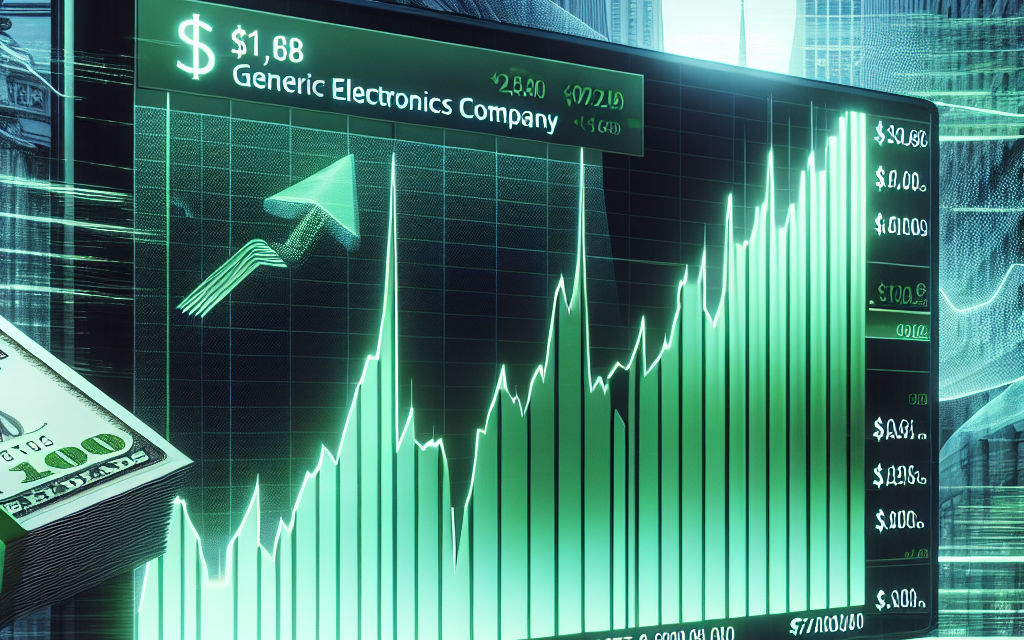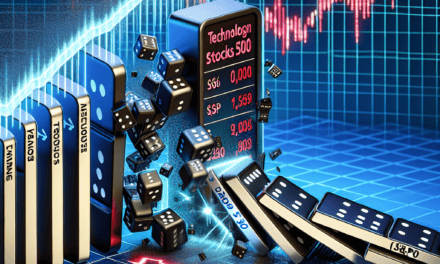“Samsung Surges: $7 Billion Buyback Ignites Market Momentum!”
Introduction
Samsung’s stock experienced a significant surge following the company’s unexpected announcement of a $7 billion share buyback. This strategic move, aimed at enhancing shareholder value and demonstrating confidence in the company’s financial health, caught investors by surprise and led to a notable increase in market enthusiasm. The buyback is one of the largest in Samsung’s history, reflecting its robust cash reserves and commitment to returning capital to shareholders. As a result, the stock’s upward trajectory underscores investor optimism about Samsung’s future growth prospects and its ability to navigate the competitive technology landscape.
Impact Of Samsung’s $7 Billion Buyback On Shareholder Value
Samsung Electronics Co., a global leader in technology and innovation, recently made headlines with its unexpected announcement of a $7 billion stock buyback. This strategic move has sent ripples through the financial markets, significantly impacting shareholder value and sparking discussions among investors and analysts alike. The buyback, which is one of the largest in the company’s history, underscores Samsung’s robust financial health and its commitment to enhancing shareholder returns.
The immediate effect of the buyback announcement was a notable surge in Samsung’s stock price. Investors, buoyed by the prospect of increased earnings per share and a more favorable supply-demand dynamic for the stock, responded positively. The buyback reduces the number of shares outstanding, thereby increasing the value of remaining shares. This mechanism not only boosts the stock price but also signals to the market that the company believes its shares are undervalued. Consequently, the buyback serves as a vote of confidence from Samsung’s management in the company’s future prospects.
Moreover, the buyback is likely to have a long-term impact on shareholder value. By repurchasing its shares, Samsung is effectively returning capital to its shareholders, which can be particularly appealing in a low-interest-rate environment where traditional income-generating investments may offer limited returns. This move aligns with the interests of long-term investors who prioritize capital appreciation and income stability. Additionally, the buyback can lead to improved financial ratios, such as earnings per share and return on equity, which are critical metrics for evaluating a company’s financial performance.
In addition to the direct financial benefits, the buyback announcement may also enhance Samsung’s strategic positioning in the competitive technology sector. By demonstrating financial strength and a commitment to shareholder value, Samsung can bolster investor confidence, which is crucial for maintaining a competitive edge. This is particularly important as the company navigates challenges such as global supply chain disruptions and intensifying competition from other tech giants. The buyback could also provide Samsung with greater flexibility in pursuing strategic initiatives, such as research and development or potential acquisitions, without the pressure of an inflated share count.
Furthermore, the buyback may influence Samsung’s corporate governance practices. By reducing the number of shares outstanding, the company can potentially streamline decision-making processes and improve governance efficiency. This can lead to more agile and responsive management, which is essential in the fast-paced technology industry. Additionally, the buyback may encourage greater engagement with institutional investors, who often advocate for shareholder-friendly practices and long-term value creation.
While the buyback has been met with enthusiasm, it is not without its critics. Some analysts caution that the funds used for the buyback could have been allocated to other strategic investments, such as expanding production capacity or enhancing technological capabilities. However, Samsung’s strong balance sheet and cash reserves suggest that the company is well-positioned to pursue multiple avenues for growth simultaneously.
In conclusion, Samsung’s $7 billion stock buyback represents a significant development with far-reaching implications for shareholder value. By enhancing stock price, improving financial metrics, and reinforcing strategic positioning, the buyback underscores Samsung’s commitment to its shareholders and its confidence in future growth. As the company continues to navigate the complexities of the global technology landscape, this bold move may well serve as a catalyst for sustained success and innovation.
Analyzing The Market Reaction To Samsung’s Buyback Announcement
Samsung’s recent announcement of a $7 billion stock buyback has sent ripples through the financial markets, capturing the attention of investors and analysts alike. This unexpected move by the South Korean tech giant has led to a significant surge in its stock price, reflecting a positive market reaction. To understand the implications of this buyback, it is essential to delve into the reasons behind the decision, the immediate market response, and the potential long-term effects on Samsung’s financial health and investor sentiment.
The decision to initiate a stock buyback of this magnitude is often interpreted as a signal of confidence from a company regarding its future prospects. By repurchasing its own shares, Samsung is effectively reducing the number of shares available in the market, which can lead to an increase in earnings per share (EPS) and, consequently, a higher stock price. This move suggests that Samsung’s management believes the company’s shares are undervalued and that investing in its own stock is a prudent use of capital. Furthermore, the buyback can be seen as a strategic effort to return value to shareholders, which is particularly appealing in times of market volatility.
In the immediate aftermath of the announcement, Samsung’s stock experienced a notable uptick, reflecting investor enthusiasm. The market’s positive reaction can be attributed to several factors. Firstly, buybacks are often perceived as a vote of confidence from the company’s leadership, reassuring investors about the firm’s financial stability and growth prospects. Secondly, the reduction in the number of outstanding shares can lead to improved financial ratios, making the stock more attractive to potential investors. Additionally, the buyback may have alleviated concerns about potential dilution from future equity issuances, further boosting investor confidence.
While the short-term market reaction has been overwhelmingly positive, it is crucial to consider the potential long-term implications of this buyback. On one hand, the reduction in share count can enhance shareholder value and improve financial metrics, potentially leading to sustained stock price appreciation. On the other hand, the allocation of $7 billion towards the buyback raises questions about Samsung’s capital allocation strategy. Critics may argue that such a substantial sum could have been invested in research and development, acquisitions, or other growth initiatives that could yield higher returns in the long run.
Moreover, the buyback could have implications for Samsung’s balance sheet. While the company boasts a strong financial position, the deployment of $7 billion for share repurchases will impact its cash reserves. Investors and analysts will be keenly observing how this decision affects Samsung’s ability to invest in future growth opportunities and maintain its competitive edge in the rapidly evolving tech industry.
In conclusion, Samsung’s $7 billion stock buyback announcement has generated significant market interest and led to a surge in its stock price. The move is widely interpreted as a sign of confidence from the company’s management and a strategic effort to enhance shareholder value. However, it also raises important questions about capital allocation and long-term growth strategies. As the market continues to digest this development, the focus will likely shift to how Samsung balances its immediate financial objectives with its long-term vision, ensuring that it remains a formidable player in the global technology landscape.
How Samsung’s Buyback Strategy Compares To Industry Trends
Samsung’s recent announcement of a $7 billion stock buyback has sent ripples through the financial markets, capturing the attention of investors and analysts alike. This strategic move, which has led to a significant surge in Samsung’s stock price, underscores the company’s commitment to enhancing shareholder value. In the broader context of industry trends, Samsung’s buyback strategy offers a fascinating case study in corporate financial management.
Stock buybacks, or share repurchases, have become a prevalent strategy among major corporations seeking to return value to shareholders. By reducing the number of outstanding shares, buybacks can increase earnings per share (EPS) and, consequently, boost stock prices. Samsung’s decision to embark on such a substantial buyback aligns with this trend, yet it also stands out due to its scale and timing. While many companies have been cautious with buybacks amid global economic uncertainties, Samsung’s bold move signals confidence in its financial health and future prospects.
In comparison to its industry peers, Samsung’s buyback strategy is particularly noteworthy. Technology giants like Apple and Microsoft have long been proponents of share repurchases, often using them as a tool to manage excess cash reserves. However, Samsung’s approach is distinct in its magnitude and the context in which it is executed. The $7 billion buyback represents a significant portion of Samsung’s market capitalization, indicating a robust commitment to shareholder returns. Moreover, this announcement comes at a time when the tech industry is navigating challenges such as supply chain disruptions and fluctuating demand, making Samsung’s confidence in its financial stability even more striking.
Furthermore, Samsung’s buyback strategy can be seen as a response to broader industry trends, where companies are increasingly prioritizing shareholder returns over aggressive expansion. In recent years, there has been a noticeable shift in corporate strategies, with many firms opting to reward shareholders through dividends and buybacks rather than pursuing risky acquisitions or capital-intensive projects. This trend reflects a more conservative approach to capital allocation, driven by the need to maintain financial flexibility in an unpredictable economic environment.
Samsung’s decision also highlights the evolving role of buybacks in corporate governance. Traditionally, buybacks were viewed as a means to deploy excess cash efficiently. However, they are now increasingly seen as a strategic tool to signal confidence in a company’s intrinsic value and future growth potential. By announcing such a substantial buyback, Samsung is not only returning capital to shareholders but also reinforcing its market position and signaling optimism about its long-term prospects.
In conclusion, Samsung’s $7 billion buyback announcement is a testament to the company’s strategic foresight and financial acumen. While aligning with industry trends of prioritizing shareholder returns, Samsung’s approach is distinguished by its scale and timing. As the tech industry continues to evolve, Samsung’s buyback strategy serves as a compelling example of how companies can leverage financial tools to navigate challenges and capitalize on opportunities. This move not only enhances shareholder value but also reinforces Samsung’s standing as a leader in the global technology landscape. As investors and analysts continue to assess the implications of this announcement, Samsung’s bold strategy will undoubtedly be a topic of keen interest and discussion in the months to come.
The Role Of Buybacks In Samsung’s Long-Term Growth Plan

Samsung’s recent announcement of a $7 billion stock buyback has sent ripples through the financial markets, causing its stock to soar and capturing the attention of investors worldwide. This strategic move is not merely a short-term tactic to boost share prices but rather a calculated step in Samsung’s long-term growth plan. Understanding the role of buybacks in this context requires a closer examination of how they fit into the broader strategy of the company.
Stock buybacks, or repurchases, occur when a company buys back its own shares from the marketplace, reducing the number of outstanding shares. This action often leads to an increase in the value of remaining shares, as it signals confidence from the company’s management in its future prospects. For Samsung, this buyback is a clear indication of its robust financial health and a commitment to returning value to its shareholders. By reducing the number of shares available, Samsung not only enhances earnings per share but also demonstrates a strong belief in its ongoing profitability and growth potential.
Moreover, this buyback aligns with Samsung’s broader strategy of maintaining a competitive edge in the technology sector. As a global leader in electronics, Samsung faces constant pressure to innovate and invest in new technologies. The capital structure optimization achieved through buybacks provides Samsung with greater financial flexibility. This flexibility is crucial for funding research and development initiatives, acquiring new technologies, and expanding into emerging markets. By strategically managing its capital, Samsung can continue to invest in areas that promise long-term growth, such as artificial intelligence, 5G technology, and semiconductor manufacturing.
In addition to financial optimization, the buyback serves as a tool for Samsung to manage its shareholder base effectively. By repurchasing shares, Samsung can mitigate the dilution of ownership that often accompanies the issuance of new shares for acquisitions or employee stock options. This approach ensures that existing shareholders retain a significant stake in the company, aligning their interests with those of the management. Furthermore, it can help stabilize the stock price by reducing volatility, which is particularly beneficial in times of market uncertainty.
The timing of this buyback is also noteworthy. As global markets experience fluctuations due to geopolitical tensions and economic uncertainties, Samsung’s decision to proceed with such a substantial buyback reflects its confidence in weathering external challenges. This move not only reassures investors but also positions Samsung as a resilient player capable of navigating complex market dynamics. By reinforcing its financial foundation, Samsung is better equipped to pursue strategic opportunities that may arise in the future.
In conclusion, Samsung’s $7 billion stock buyback is a multifaceted strategy that plays a crucial role in its long-term growth plan. It is a testament to the company’s financial strength and its commitment to enhancing shareholder value. By optimizing its capital structure, managing its shareholder base, and positioning itself for future opportunities, Samsung is laying the groundwork for sustained growth and innovation. As the company continues to evolve in the rapidly changing technology landscape, this buyback serves as a pivotal component of its strategy to maintain its leadership position and drive long-term success.
Investor Sentiment: Why Samsung’s Buyback Boosted Confidence
Samsung Electronics recently made headlines with its unexpected announcement of a $7 billion stock buyback, a move that has significantly bolstered investor confidence and sent its stock soaring. This strategic decision comes at a time when global markets are experiencing volatility, and it underscores Samsung’s commitment to enhancing shareholder value. The buyback announcement has not only provided a short-term boost to the company’s stock price but has also sparked a broader discussion about the implications for long-term investor sentiment.
To understand the impact of this buyback, it is essential to consider the context in which it was announced. Samsung, a global leader in technology and consumer electronics, has faced a challenging environment marked by supply chain disruptions and fluctuating demand. Despite these hurdles, the company has demonstrated resilience, maintaining robust financial health and a strong market position. The decision to initiate a buyback of this magnitude signals confidence in its future prospects and financial stability, reassuring investors who may have been concerned about the broader economic landscape.
Moreover, stock buybacks are often perceived as a positive signal by the market, as they indicate that a company believes its shares are undervalued. By repurchasing its own shares, Samsung effectively reduces the number of outstanding shares, thereby increasing the value of remaining shares. This move is particularly appealing to investors seeking capital appreciation, as it can lead to an increase in earnings per share (EPS) and, consequently, a higher stock price. In Samsung’s case, the buyback announcement has already resulted in a notable uptick in its stock price, reflecting renewed investor optimism.
In addition to the immediate financial benefits, the buyback also reflects Samsung’s strategic priorities. By allocating a substantial portion of its capital to repurchase shares, the company is demonstrating a commitment to returning value to shareholders. This approach aligns with the interests of long-term investors who prioritize sustainable growth and value creation. Furthermore, the buyback can be seen as a vote of confidence in Samsung’s ability to generate strong cash flows, even in a challenging economic environment. This assurance is crucial for investors who are increasingly focused on the financial resilience of the companies in which they invest.
The timing of the buyback is also noteworthy. As global markets grapple with uncertainty, Samsung’s decisive action provides a sense of stability and predictability. This is particularly important for institutional investors who seek to minimize risk and ensure steady returns. By taking proactive measures to support its stock price, Samsung is positioning itself as a reliable investment option, which can attract new investors and retain existing ones.
In conclusion, Samsung’s $7 billion stock buyback has had a profound impact on investor sentiment, reinforcing confidence in the company’s financial health and strategic direction. The move not only enhances shareholder value in the short term but also underscores Samsung’s commitment to long-term growth and stability. As the company navigates an ever-evolving market landscape, this buyback serves as a testament to its resilience and forward-thinking approach. Investors, in turn, are likely to view Samsung as a compelling investment opportunity, buoyed by the company’s proactive efforts to enhance shareholder returns and its unwavering focus on sustainable value creation.
Financial Implications Of Samsung’s $7 Billion Buyback
Samsung’s recent announcement of a $7 billion stock buyback has sent ripples through the financial markets, capturing the attention of investors and analysts alike. This unexpected move has led to a significant surge in Samsung’s stock price, reflecting the market’s positive reception and the potential financial implications for the company. The buyback, a strategic decision by Samsung’s management, is aimed at enhancing shareholder value and demonstrating confidence in the company’s future prospects.
The decision to initiate such a substantial buyback is particularly noteworthy given the current economic climate, where many companies are exercising caution due to global uncertainties. By opting for a buyback of this magnitude, Samsung is signaling its robust financial health and its commitment to returning capital to shareholders. This move is likely to bolster investor confidence, as it suggests that the company believes its stock is undervalued and that it has sufficient cash reserves to undertake such a significant financial maneuver.
Moreover, the buyback is expected to have several positive financial implications for Samsung. Firstly, it will reduce the number of outstanding shares, thereby increasing earnings per share (EPS). This, in turn, can make the stock more attractive to investors, potentially leading to further appreciation in its market value. Additionally, the buyback can serve as a buffer against market volatility, providing a level of stability to the stock price during uncertain times.
Furthermore, the buyback aligns with Samsung’s broader strategic objectives. By repurchasing shares, the company can optimize its capital structure, ensuring that it maintains an efficient balance between debt and equity. This can enhance the company’s financial flexibility, allowing it to pursue growth opportunities, such as investments in research and development or strategic acquisitions, without being overly reliant on external financing.
The announcement has also sparked discussions about Samsung’s long-term growth prospects. The buyback could be interpreted as a signal that the company is confident in its ability to generate strong cash flows in the future. This confidence may stem from Samsung’s leadership position in key markets, such as semiconductors and consumer electronics, where it continues to innovate and expand its product offerings. As a result, investors may view the buyback as a vote of confidence in Samsung’s ability to sustain its competitive edge and drive future growth.
However, it is important to consider potential risks associated with the buyback. Critics may argue that the funds allocated for the buyback could have been used for other strategic initiatives, such as expanding into new markets or enhancing existing product lines. Additionally, while the buyback may provide short-term support to the stock price, it does not address underlying operational challenges that the company may face in the future.
In conclusion, Samsung’s $7 billion buyback announcement has significant financial implications, reflecting the company’s strong financial position and its commitment to enhancing shareholder value. While the move has been positively received by the market, it also raises important questions about the company’s long-term strategic priorities. As Samsung navigates the complexities of the global market, the buyback serves as a testament to its confidence in its future prospects and its ability to deliver sustained value to its shareholders.
Future Outlook: What Samsung’s Buyback Means For The Tech Sector
Samsung’s recent announcement of a $7 billion stock buyback has sent ripples through the tech sector, capturing the attention of investors and analysts alike. This unexpected move has not only propelled Samsung’s stock to new heights but also sparked discussions about its implications for the broader technology industry. As the company embarks on this significant buyback initiative, it is essential to explore the potential future outlook for Samsung and the tech sector as a whole.
To begin with, stock buybacks are often perceived as a signal of confidence from a company regarding its financial health and future prospects. By repurchasing its own shares, Samsung is effectively reducing the number of shares available in the market, which can lead to an increase in earnings per share (EPS) and, consequently, a rise in stock value. This strategic decision suggests that Samsung is optimistic about its future growth trajectory and is committed to enhancing shareholder value. Moreover, the buyback could be interpreted as a response to the company’s robust cash reserves, indicating that it has sufficient capital to invest in its core operations while simultaneously rewarding its investors.
Furthermore, Samsung’s buyback announcement comes at a time when the tech sector is experiencing rapid transformation and heightened competition. As companies strive to innovate and capture market share, having a strong financial position becomes increasingly crucial. Samsung’s decision to execute a buyback could be seen as a strategic maneuver to solidify its standing in the industry, particularly as it faces challenges from both established competitors and emerging players. By reinforcing investor confidence, Samsung may be better positioned to pursue strategic acquisitions, invest in research and development, and expand its product offerings.
In addition to its impact on Samsung, the buyback announcement may also have broader implications for the tech sector. As one of the leading players in the industry, Samsung’s actions often set a precedent for other companies. The buyback could potentially trigger a wave of similar initiatives among tech firms, as they seek to emulate Samsung’s approach to enhancing shareholder value. This trend could lead to increased investor interest in the sector, driving up stock prices and encouraging further investment in technology companies.
Moreover, the buyback may influence the strategic priorities of other tech firms. As Samsung demonstrates its commitment to returning capital to shareholders, other companies may feel compelled to reassess their own capital allocation strategies. This could result in a shift towards more shareholder-friendly policies, such as increased dividends or additional buybacks, as companies strive to remain competitive in attracting and retaining investors.
In conclusion, Samsung’s $7 billion stock buyback announcement is a significant development with far-reaching implications for both the company and the tech sector. By signaling confidence in its future prospects and reinforcing its financial position, Samsung is poised to navigate the challenges and opportunities that lie ahead. As the tech industry continues to evolve, the buyback may serve as a catalyst for similar initiatives among other companies, ultimately shaping the future landscape of the sector. As investors and analysts closely monitor these developments, the coming months will undoubtedly provide further insights into the long-term impact of Samsung’s strategic decision.
Q&A
1. **What caused Samsung’s stock to soar?**
Samsung’s stock soared following the announcement of an unexpected $7 billion stock buyback.
2. **How much is Samsung’s buyback worth?**
The buyback is worth $7 billion.
3. **Why is a stock buyback significant for investors?**
A stock buyback can increase the value of remaining shares, signaling confidence in the company’s future prospects.
4. **How did the market react to the buyback announcement?**
The market reacted positively, with Samsung’s stock price increasing significantly.
5. **What is the potential impact of the buyback on Samsung’s financials?**
The buyback could improve earnings per share and return on equity by reducing the number of outstanding shares.
6. **What might be Samsung’s strategic reason for the buyback?**
Samsung might aim to boost shareholder value and demonstrate financial strength and confidence in its business strategy.
7. **How does this buyback compare to previous ones by Samsung?**
This $7 billion buyback is one of the largest in Samsung’s history, indicating a strong commitment to returning value to shareholders.
Conclusion
Samsung’s stock experienced a significant surge following the unexpected announcement of a $7 billion buyback. This move likely signals the company’s confidence in its financial health and future prospects, aiming to enhance shareholder value by reducing the number of outstanding shares and potentially increasing earnings per share. The buyback could also be interpreted as a strategic maneuver to bolster investor sentiment and stabilize the stock price amidst market fluctuations. Overall, the announcement has positively impacted investor perception, reflecting optimism about Samsung’s growth trajectory and financial strategy.





